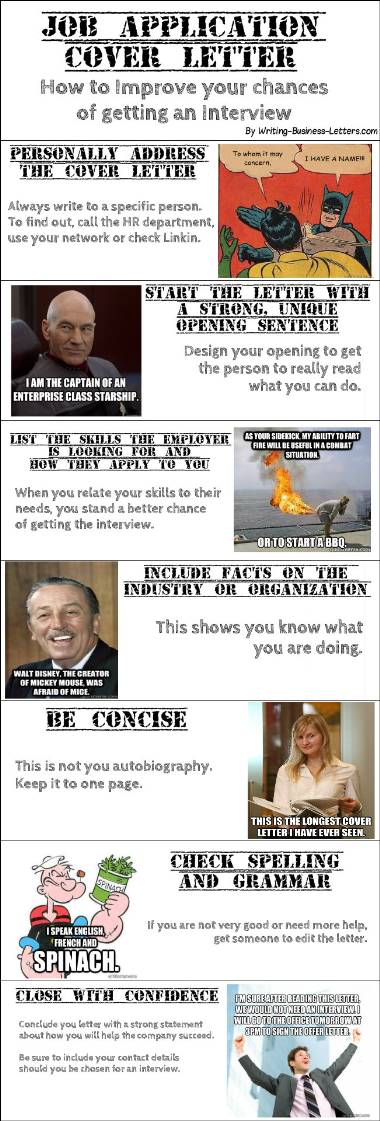Resume Cover Letter - What Every Job Seeker Ought to Know
This job search advice comes from my years of experience as a manager with 13 people reporting to me as well as my experience as an employee looking for a job. What I will cover here is what works in the real world and not academic.

No CV cover letter = No Interview
The cover letter (also know as covering letter) is a letter accompanying your resume in job application. It is a very influential tool to get an interview. Since the average advertised job opening usually gets around 200 applications of more, the hiring personnel will usually shortlist the applications.
The applications without a letter are the first ones to go. The logic is that if you are too lazy to write a letter, you’ll be too lazy to work.
If you live in a country where cover letters are not normal, then the application with a letter gets extra credit and has a better chance of making the short list.
The next to go are the poorly written letters. The logic is the same, if you are too lazy to write a good one, you’ll be too lazy to do a good job too. If they are happy with it, then they will look at your resume. After that the shortlist is completed.
How to write a covering letter that gets interviews?
Many people asked me what should the letter include? Well, the following are all the important elements that you should include in your letter.
Use the correct business letter format
A cover letter is like any other business letters. You should follow everything that has been discussed in my business letter format page. Make sure you use high quality paper.Addressing the letter
Always write to a specific person, not "to whom it may concern", or Dear Sir/Madam".To find out, call the HR department and find out whom the HR manager is, or the name of the manager in charge of the department you want to work under.
Use your network; do you know someone who is in the company or industry? Can they help you?
Use Linkedin. A lot of information is available right there.
What to include in the body of your covering letter
Always make sure you are 100% correct in spelling, grammar and facts. Use the spell and grammar checker from your word processor. If you are not very good or need more help, get someone to edit the letter. If you can afford it, use a professional writing service.Research the target organization and include information or facts relating to your would be job or industry.
Analyze the job. Check for the noted and assumed needs and determine the most important skills the employer is looking for.
Use a strong opening sentence. Do not use the standard openings like "I wish to apply for the position of … advertised in …".
For example, if the job is for a sales manager, write something like "A proven track record in developing new business and increasing sales…"
Design your opening to get the person to really read what you can do. Address the employers' needs identified earlier.
Make your letter visually appealing and coordinated with your resume. Do not overdo the style elements. One type font is never wrong (unless you are in the arts.)
Be concise. This is not you autobiography. Keep it to one page. If you have a lot of experience, cut it down to the ones that are relevant to the needs of the employer identified earlier. A good way to keep this short is to use bullet points.
Address how you will meet the employers' needs.
In the body of the letter, show them that you can meet the needs of the employer.Use the job advertisement and your network; do you know someone who is in the company or industry? Can they help you find out what are the important skills required for that job?
End Game: Get The Interview
Conclude the letter with "the contributions I'll bring to your company …". This stress the fact that you can help the employer.Make sure you include a P.S. in the letter. This is a little sales letter trick that works very well. In a sales letter it is often use as a call to action. Use it here as well. Say something like "I would love the opportunity to meet in person for an interview. I can be reached at ...".
Improve your chances of getting a job
One way to better your chances of getting a job is to tap into the hidden market. What is The Hidden Job Market? The general consensus is that it is made up of jobs that are not advertised.Many articles and reports have been written about this hidden market, the statistics quoted range from 80 to 85%. So, if 80-85% of jobs are not advertised, how do employers fill them?
Well, most of these jobs are advertised via word of mouth. If a position is open, then the employer will ask around if anyone knows someone who can fill the position.
If the employer gets enough recommendations (usually around 3 to 10), they will start the interview process. If the employer does not get enough recommendations, they will turn to the recruiters.
If you have done your networking well, you will be told of such an opening.
Now, here is another important advice, when you do get recommended to fill a position via your network of friends and recruiters, do include your cover letter. Most people do not include a letter in this situation. If you do, you immediately set yourself apart from the others.
Now, even if you do not get the job, it is not all wasted effort. If you have sufficiently impressed the reader with your letter, but were not selected because you were not the right fit for the job, the reader will remember you and pass your resume along.
As managers, we talk to each other and we know if someone else is looking to hire people. If we remember you and someone we know is looking for what you have, we will pass your details around. I have filled a few positions this way.
A slightly related but important tip is to include a few good letter of recommendations along with your letter and CV.
As I explained in my advice on the reference letter, this letter helps you provide strong strong evidence of your strengths, abilities and achievements. Much more effective than a cover letter ever would.
Advice from other employers
Now, that is my advice. But it is always best to get the advice from multiple experts. The following video has 6 hiring managers talking about what they look for in a cover letter. It pretty much says what I say.
Examples
 |
So I thought maybe something a bit more fun for this dry subject. I am a fan of Harry Potter and this is a cover letter written by Severus Snape (before he became a Professor at Hogwarts) to Lord Voldemort applying to be a Death Eater. My explanations are highlighted in yellow.
(Writing to a specific person)
A proven track record in potion making, spell casting especially in hexes and curses and a talented duellist is the background I’ll bring to your Death Eater position.
(Strong opening sentence appealing to the requirements of the job).
Allow me to highlight my strengths:
- Significantly increased the strength (by five times) of the Draught of Living Death potion.
- Created many new spells including the Sectumsempra spell (this spell violently wounds the target).
- Mastered many hexes and curses.
- Hogwarts Duelling champion 3 years in a row.
I would like to discuss in greater detail the contributions I would make in your army. I can be reached with the Enchanted Coin attached.
(This emphasize to the employer that he can add value. He also makes sure there is contact details. In the non magical world, we should put a phone number and/or email.)
Your time and consideration is most appreciated.
Sincerely,
Severus Snape
p.s. Your current Death Eaters Avery and Mulciber can vouch for my strengths.
(A p.s. captures the attention of the employer. In this case, he points out contacts that the employer can refer to.)
Here are some more examples for you to understand the process.
Sample for Manager
Assistant Example
CFO Sample
Return to Business Letters from cover letter
Advice for new job seekers
The following is a question from one of my readers. I believe the advice I gave him or her applies to anyone who is new to the job market and cannot find a job right now.
Offer my time in exchange for On Job Training?
How do I introduce or offer my time to potential employers in exchange for On The Job Training?
---------------------------
Hi,
Congratulations. You have the drive to be successful. I love this kind of an attitude.
To ask for this kind of exchange, what you need to do is identify what kind of job you really want to learn. Then, approach the companies that have the need for people to do the kind of work.
Before you approach these companies, prepare your resume and a job application covering letter. In the letter, explain your passion for the job and why you are willing to work for free.
Do you know anyone in these companies? Do you know someone who knows someone in those companies? If so, ask them to introduce you. Once you know the person working in the company, tell them that you want to work for the company for free. You just want to get the experience. Then ask them to give your resume and letter to the person in charge of hiring.
If you do not have any contacts, go to the companies you identified and ask to speak to the HR person.
When you meet the HR person, tell him/her that you want to work for the company for free and why. Then give them your resume and cover letter.
Be prepared to work from the bottom up though.
My first experience was working for a small accounting firm as the office boy. Basically, I did a lot of photocopying, filling and things they don't want to do.
Good luck in your job search.
Regards,
Dax
Hi I'm Dax...
 I’m an entrepreneur, mentor, consultant and I was a global IT service manager for one of the largest multinational in the world.
I’m an entrepreneur, mentor, consultant and I was a global IT service manager for one of the largest multinational in the world.
I'm here to help you write better business letters.
Free Downloads:
597 Business Letters - Software






